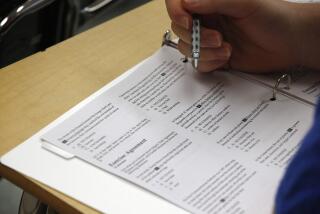Letters to the Editor: Keeping smart but poor, low-scoring students out of college helps no one
To the editor: If the playing field were level, the SAT and ACT would be good tests for college admission. But when kids are chronically tired, hungry, sick or unsafe, they cannot learn as well as others. And they do not test well enough to show their intellectual potential.
UC Riverside sophomore Melissa Morfin-Acevedo, who performed poorly on the SAT but had a 4.1 high school GPA, is not only lucky, she is one of the rare super-driven young people who can push through the mess to beat the system.
The cost to the rest of us who lose those bright people is unfathomable.
The cuts to food stamps and other protections for the disadvantaged are cruel and ugly. These programs are not “charity.” We need the smartest kids for the future.
Michael Gross, Woodland Hills
..
To the editor: Keep the SATs, but use the test results only to create a “normalization factor” for each high school.
A school with high grade inflation might earn a factor of 0.90, for example. A student from this school who had earned a 4.0 GPA would, for college admission purposes, get credit for only a 3.6 GPA.
With this system parents would most likely not spend money on SAT test preparation, but the students would still be motivated to help their school receive the best normalization factor.
Joseph Beerer, Glendale
..
To the editor: Your article cherry-picked, presenting a somewhat biased view against standardized testing.
There are also students who do not have high GPAs but test well. No examples were given of them.
I was one such student, and I did not take test preparation classes. I attended a lily-white suburban high school in the 1950s where I received a good education. Grade inflation was not prevalent back then. I was obliged to take a separate, college-administrated exam to get into an engineering school.
Upon entering, I was embarrassed to find that a preponderance of my classmates came out of the top 5% of their high school classes, many from lower-rated city schools. Many, unlike me, were study nerds who cared about their high school grades. They weren’t into sports of other social activities.
Upon completion, only two of seven of us who started in the program graduated. Many of the dropouts transferred to other fields, like business, but didn’t make it in engineering.
I’m biased, but eliminating SATs would preclude people like me from attending college. A balance is needed.
David Ferrier, Brea
More to Read
A cure for the common opinion
Get thought-provoking perspectives with our weekly newsletter.
You may occasionally receive promotional content from the Los Angeles Times.






